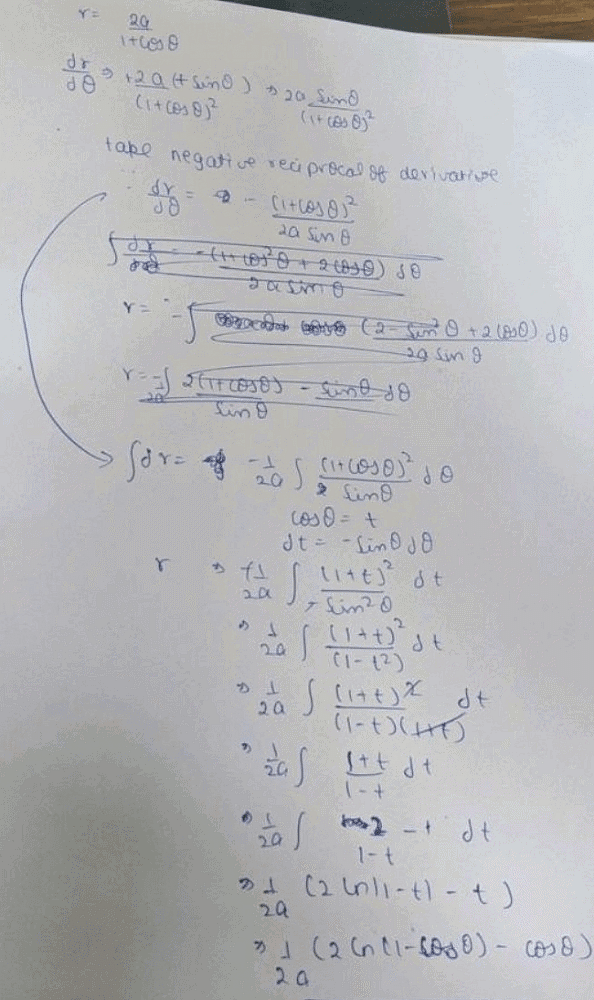Computer Science Engineering (CSE) Exam > Computer Science Engineering (CSE) Questions > Orthogonal trajectories of r=2a/(1 cosx)?
Start Learning for Free
Orthogonal trajectories of r=2a/(1 cosx)?
Most Upvoted Answer
Orthogonal trajectories of r=2a/(1 cosx)?
Introduction:
In mathematics, orthogonal trajectories are the curves that intersect each other at right angles. When a family of curves is given, the orthogonal trajectories are the curves that are perpendicular to each member of the given family.
Given Curve:
The given curve is r=2a/(1+cosx).
Deriving the Equation:
To find the orthogonal trajectories of the given curve, we need to first derive the differential equation of the family of curves.
We can write the given curve in polar coordinates as
x = r cosθ
y = r sinθ
r = 2a/(1+cosx) = 2a/(1+cosθ)
Squaring both sides, we get
r^2 = 4a^2/(1+cosθ)^2
Substituting x and y in terms of r and θ, we get
x^2 + y^2 = r^2 = 4a^2/(1+cosθ)^2
Differentiating both sides with respect to θ, we get
2x(dx/dθ) + 2y(dy/dθ) = -8a^2sinθ/(1+cosθ)^3
Substituting y/x = dy/dx, we get
2(dx/dθ + y/x)dx/dθ = -8a^2sinθ/(1+cosθ)^3
Simplifying the equation, we get
dx/dθ + y/x = -4a^2sinθ/(x(1+cosθ)^3)
Deriving the Orthogonal Trajectories:
To find the orthogonal trajectories, we need to find the differential equation of the curves that intersect the given family of curves at right angles.
The slope of the curves in the given family is given by
dy/dx = (dy/dθ)/(dx/dθ) = (r sinθ)/(r cosθ) = tanθ
The slope of the orthogonal trajectories is given by
dy/dx = -1/tanθ = -cotθ
Therefore, the differential equation of the orthogonal trajectories is
dy/dx = -cotθ = -x/y
Substituting y/x = dy/dx, we get
y^2 = -x^2 + C
where C is the constant of integration.
Therefore, the orthogonal trajectories of the given curve r=2a/(1+cosx) are given by the equation y^2 = -x^2 + C.
Conclusion:
In summary, we derived the differential equation of the given family of curves and used it to find the differential equation of the orthogonal trajectories. We then solved the differential equation of the orthogonal trajectories to obtain the equation of the curves that intersect the given family of curves at right angles.
In mathematics, orthogonal trajectories are the curves that intersect each other at right angles. When a family of curves is given, the orthogonal trajectories are the curves that are perpendicular to each member of the given family.
Given Curve:
The given curve is r=2a/(1+cosx).
Deriving the Equation:
To find the orthogonal trajectories of the given curve, we need to first derive the differential equation of the family of curves.
We can write the given curve in polar coordinates as
x = r cosθ
y = r sinθ
r = 2a/(1+cosx) = 2a/(1+cosθ)
Squaring both sides, we get
r^2 = 4a^2/(1+cosθ)^2
Substituting x and y in terms of r and θ, we get
x^2 + y^2 = r^2 = 4a^2/(1+cosθ)^2
Differentiating both sides with respect to θ, we get
2x(dx/dθ) + 2y(dy/dθ) = -8a^2sinθ/(1+cosθ)^3
Substituting y/x = dy/dx, we get
2(dx/dθ + y/x)dx/dθ = -8a^2sinθ/(1+cosθ)^3
Simplifying the equation, we get
dx/dθ + y/x = -4a^2sinθ/(x(1+cosθ)^3)
Deriving the Orthogonal Trajectories:
To find the orthogonal trajectories, we need to find the differential equation of the curves that intersect the given family of curves at right angles.
The slope of the curves in the given family is given by
dy/dx = (dy/dθ)/(dx/dθ) = (r sinθ)/(r cosθ) = tanθ
The slope of the orthogonal trajectories is given by
dy/dx = -1/tanθ = -cotθ
Therefore, the differential equation of the orthogonal trajectories is
dy/dx = -cotθ = -x/y
Substituting y/x = dy/dx, we get
y^2 = -x^2 + C
where C is the constant of integration.
Therefore, the orthogonal trajectories of the given curve r=2a/(1+cosx) are given by the equation y^2 = -x^2 + C.
Conclusion:
In summary, we derived the differential equation of the given family of curves and used it to find the differential equation of the orthogonal trajectories. We then solved the differential equation of the orthogonal trajectories to obtain the equation of the curves that intersect the given family of curves at right angles.
Attention Computer Science Engineering (CSE) Students!
To make sure you are not studying endlessly, EduRev has designed Computer Science Engineering (CSE) study material, with Structured Courses, Videos, & Test Series. Plus get personalized analysis, doubt solving and improvement plans to achieve a great score in Computer Science Engineering (CSE).

|
Explore Courses for Computer Science Engineering (CSE) exam
|

|
Similar Computer Science Engineering (CSE) Doubts
Orthogonal trajectories of r=2a/(1 cosx)?
Question Description
Orthogonal trajectories of r=2a/(1 cosx)? for Computer Science Engineering (CSE) 2024 is part of Computer Science Engineering (CSE) preparation. The Question and answers have been prepared according to the Computer Science Engineering (CSE) exam syllabus. Information about Orthogonal trajectories of r=2a/(1 cosx)? covers all topics & solutions for Computer Science Engineering (CSE) 2024 Exam. Find important definitions, questions, meanings, examples, exercises and tests below for Orthogonal trajectories of r=2a/(1 cosx)?.
Orthogonal trajectories of r=2a/(1 cosx)? for Computer Science Engineering (CSE) 2024 is part of Computer Science Engineering (CSE) preparation. The Question and answers have been prepared according to the Computer Science Engineering (CSE) exam syllabus. Information about Orthogonal trajectories of r=2a/(1 cosx)? covers all topics & solutions for Computer Science Engineering (CSE) 2024 Exam. Find important definitions, questions, meanings, examples, exercises and tests below for Orthogonal trajectories of r=2a/(1 cosx)?.
Solutions for Orthogonal trajectories of r=2a/(1 cosx)? in English & in Hindi are available as part of our courses for Computer Science Engineering (CSE).
Download more important topics, notes, lectures and mock test series for Computer Science Engineering (CSE) Exam by signing up for free.
Here you can find the meaning of Orthogonal trajectories of r=2a/(1 cosx)? defined & explained in the simplest way possible. Besides giving the explanation of
Orthogonal trajectories of r=2a/(1 cosx)?, a detailed solution for Orthogonal trajectories of r=2a/(1 cosx)? has been provided alongside types of Orthogonal trajectories of r=2a/(1 cosx)? theory, EduRev gives you an
ample number of questions to practice Orthogonal trajectories of r=2a/(1 cosx)? tests, examples and also practice Computer Science Engineering (CSE) tests.

|
Explore Courses for Computer Science Engineering (CSE) exam
|

|
Suggested Free Tests
Signup for Free!
Signup to see your scores go up within 7 days! Learn & Practice with 1000+ FREE Notes, Videos & Tests.


























